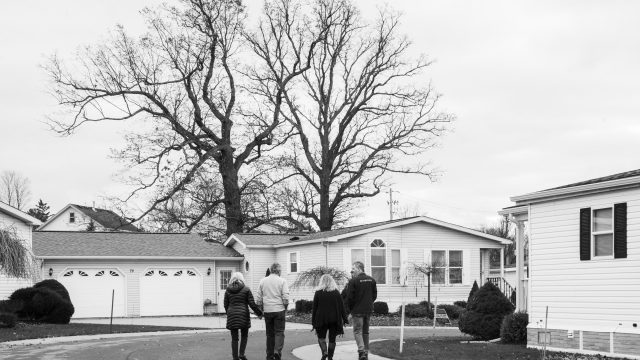By Emma Whitford | Photographs by Shane Lavalette for TIME
November 30, 2018
Maribeth Sheedy got a letter from her new landlord the day after Christmas last year. So did many of her neighbors at Akron Manufactured Home Community in Akron, New York, a rural village 25 miles northeast of Buffalo. The park’s new owner, Florida-based Sunrise Capital Investors, was proposing a rent increase of more than 40 percent starting in the spring. Anyone who couldn’t pay $425 per month would be evicted.
“We all scratched our heads,” Sheedy, 45, recalled on a steamy afternoon in September. The mother of two sat in a folding chair in the garage attached to her double-wide manufactured, or mobile, home shushing her 12-year-old Pomeranian mix Coco. “That was the day that we met and decided something had to be done.”
Mobile home park residents, most of whom own their trailers but rent the land beneath them, have always been among America’s most vulnerable low-income homeowners. But since the 2008 financial crisis, and as an aging generation of mom-and-pop park owners cashes out, a new breed of investors bent on raising rents to increase returns has bought up a growing share of the market. In July, Blackstone Group, the world’s largest private equity firm, bought a portfolio of 14 mobile home parks in California and Arizona for $172 million—not to redevelop, but to operate. It’s one sign, according to Jim Baker of the watchdog Private Equity Stakeholder Project, “that the industry is becoming a commodity.”
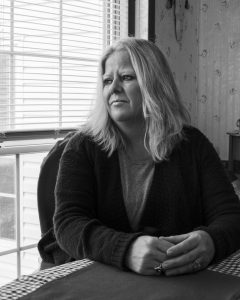
Mobile homes represent the largest sector of non-subsidized affordable housing in the United States, home to 22 million Americans with a median annual income of less than $30,000. In New York, according to the state, there are now nearly 70,300 trailers across more than 1,900 parks. Yet demand exceeds supply. Restrictive zoning nationally has slowed the creation of new parks, and even where alternatives exist, moving a trailer from one park to another can cost more than $5,000, meaning many residents can’t afford to move when their rents go up. Park owners, says University of Colorado sociologist and industry expert Esther Sullivan, “know they have a captive audience.”
But increasingly, residents are challenging their corporate owners. “The first initial pivot we try to make is, you’re not alone,” says Kevin Borden, an organizer with Manufactured Housing Action, a national nonprofit that helps tenants like Sheedy form associations. “This is a trend. It’s happening everywhere.” Last year MHAction helped secure rent stabilization for some parks in Humboldt County, California.
After their Christmas shock, Sheedy and her neighbor Ron Barone, a retired body-shop owner, started knocking on doors around their 120-home park, inviting residents to a meeting at the American Legion Hall in town. They quickly learned that New York property law prohibits park owners from increasing rents more than once every 12 months: notable since the previous owners, Thomas and his mother Dona Doll, had just issued a $10 rent increase in October 2017. Sunrise retreated after they heard from the residents, the Village Board of Trustees, and a local legislator. “In retrospect, we understand your frustrations related to the proposed rent increases,” the company said in a letter dated March 13.
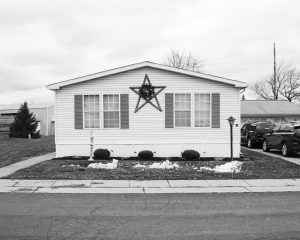
However, Sunrise still plans to raise rents to $360 this December in order to “adequately serve the community”: up $70 to $95 depending on the size of the trailer. Rents will continue to rise each year, Sunrise says, hitting the market rate of $500 or more in 2021. “Even with the increases we don’t believe there is a better value anywhere in the area,” Sunrise spokesman Ron Favali told TIME.
But Sheedy and her neighbors insist that even incremental increases are untenable. More than half of the park’s residents are unemployed. Three-quarters, like 68-year-old disabled veteran Gary Karaskiewicz, are on fixed income. “We’re not rich people or we wouldn’t live here,” Karaskiewicz says. “What do we do, pay the next month’s rent and then skip the heat bill?” Now the Akron group is expanding their organizing efforts to include other park tenants in the region, and even traditional apartment renters in Rochester and New York City.
“I thought to myself, am I going to get kicked out of here?”
Sunrise purchased the Akron park for $3.77 million in November 2017. The company paid less than $1 million up front, though, and agreed to pay the balance to the Dolls over the next five years. Sunrise CEO Kevin Bupp notes the potential benefits to the buyer of seller-financing in his weekly podcast, Real Estate Investing for Cash Flow. These include no background check, no credit check, and “no need to prove an existing track record.”

The Manufactured Housing Institute, a national trade organization, praises private investment in mobile home parks. “Investors are often better positioned to commit the necessary resources needed to maintain and upgrade a property,” a spokesperson said in a statement to TIME. Frank Rolfe, a multi-millionaire investor and cofounder of Mobile Home Park University, defends the model. “We’re the only folks out there who provide unsubsidized affordable housing,” he says, “but we get criticized for trying to run the business as a business.”
Affordable housing advocates say they’ve observed how highly leveraged acquisitions can harm residents. According to Allison Formanack, an anthropology professor at the University of Colorado who has lived in mobile home parks for her research, “When large companies have to make a decision between profit or repair and maintenance, oftentimes they’ll go with profit to maintain their shareholder value.”
For years before the sale, says former Akron manager Mark Kloss, the Dolls kept track of everyone who was too frail to prep their trailer for winter and checked their pipes—a tricky task typically left to residents—for a nominal fee. Now residents say they’ve dealt with a revolving door of managers, only the most recent of whom lives on site.
The residents also say that the roads were not adequately plowed or salted last winter. “That was flat-out dangerous,” recalls 64-year-old Pepe Kramer, a retired sales rep for Jelly Belly. “A couple of people fell and got hurt.” The residents say they have requested an in-person meeting with Sunrise leaders, but Sunrise has not agreed to meet. (Favali said the company was “not made aware” of falls but follows “standard procedures for snow removal.” Although no management company was in place last winter, Favali added that Sunrise has publicized a phone number for the current management company, M. Shapiro, whose lawyer recently contacted the residents’ lawyer to discuss complaints.)
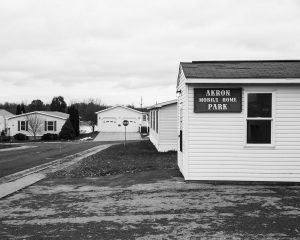
The new Akron tenant association is made up primarily of younger residents, many of whom feel protective toward their elderly and disabled neighbors. “I’ve gone to the website where they [Sunrise] describe themselves as opportunistic. Which to me has a horribly negative connotation,” says 65-year-old Gail Travers, a retired nurse who moved to the park in September 2017 with her teenage grandson.
Pat Damon is an 85-year-old widow on Social Security who will celebrate her ten-year anniversary in the park next month. Bright-eyed with gray curls, she sends annual birthday cards to every congregant at Calvary Baptist Church in Akron, where her late husband was a preacher. The first letter from Sunrise felt like “someone had punched me in the stomach,” she says. “I thought to myself, am I going to get kicked out of here? I lived a lot of years before I had a home of my own, and I know that this is something that brought a lot of joy to my husband.”
According to Favali, Sunrise’s goal “is to create clean, safe, friendly communities for all of our residents in all of our properties.” Yet on his podcast, Bupp strikes a different tone. In one episode, titled “The 5 Quickest Ways to Increase the Value of a Mobile Home Park,” he urges his listeners to raise rents upon purchase, as doing so “goes immediately to your bottom line.” Charging residents for utilities “allows you to pass your expense directly on to the resident and make a ton of extra money,” he adds.
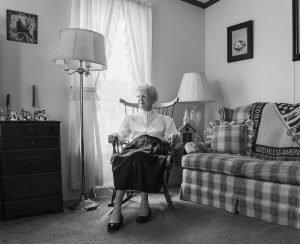
“The podcast is geared to a very, very specific audience, and that is investors,” Favali said, after hearing that Sheedy and her neighbors listened to it. “Unfortunately the residents see that… they’re not messages that were tailored to their needs.”
“We can help the next one.”
Sheedy says that she managed to live at the Akron Manufactured Home Community for 12 years without ever really getting to know her neighbors. The first emergency meeting about rent hikes last winter “was 100 strangers coming into a room together and it was just mayhem,” she recalls.
The mood has changed. In July, Sheedy decided to organize a neighborhood picnic, the park’s first. She remembers bolting out of bed that morning, anxious that her elderly neighbors would be stranded without a convenient bathroom. The solution was parked in her driveway: the family camper van. “We literally took it down the street, backed it in, and we had a restroom for everybody,” she recalls. The party lasted all afternoon, eventually morphing into a sing-along jam session. “We didn’t realize we had talented singers and guitar players here,” Sheedy said.
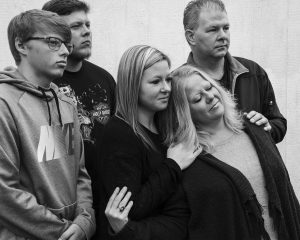
Association members have learned to play to their strengths. Barone, with his baritone and wide smile, likes to walk the neighborhood personally inviting people to meetings and calming their fears. Pepe Kramer’s husband, Ed, a Vietnam veteran, worked as a property manager before retirement; he keeps meticulous handwritten records in a marbled notebook about shoddy plowing and clogged drains. Sheedy’s nickname is the “Energizer bunny.” Another member started a monthly prayer group where neighbors discuss the toll the financial stress is taking on them.
Together, they’ve juggled everyday issues like icy roads with big problems like the looming December rent increase, and the lack of legal protections for park residents in New York and across the country. In June, one Akron resident flew to New York City to participate in a day of action for universal rent control—a new tenant-led campaign that frames New York’s affordable housing crisis as a statewide issue. Demands include the right to a lease renewal for all renters, and protections against untenable rent hikes in parks and apartments. When she returned, she told her neighbors how exciting it was to meet apartment dwellers from New York City, Long Island and Rochester facing the same challenges.

Meanwhile, Sheedy has been in touch with the state’s housing preservation agency, the Division of Housing and Community Renewal. HCR tipped her off when the park’s then-management company, Clear Trail, purchased a mobile home park called Expressway Village, 30 miles away in Niagara. Sheedy called up a resident there, a 56-year-old retired waitress named Stacey White. The two women swapped stories about their winter without plowing or salting, their frustrating managers and threatened rent increases. (“It will take some time to address all of the challenges, but we’re pleased with the progress,” a spokesperson for Clear Trail told TIME. “Our practice has been to implement reasonable rental rate increases on an annual basis.”)
White later explained that fear among residents proved “one of our biggest brick walls” to organizing a tenant association in Niagara, which she did this fall. Sheedy’s support, she says, has helped her continue. “Somebody helped Maribeth, [now] she’s helping us,” White said. “And eventually, you know, we’re strong enough, and we can go forward, and we can help the next one.”
“Policy follows pain.”
Stabilizing NYC, a coalition of grassroots affordable housing groups in New York City, has identified telltale signs of so-called “predatory equity,” including neglected property maintenance and a high debt-to-income ratio. Watching these symptoms spread through New York’s manufactured housing stock has been “a very big concern for us,” says Dina Levy, senior vice president of single family and community development at the state’s Division of Housing and Community Renewal.
Levy’s office this year launched a preservation loan program, available to park owners and nonprofits, that she hopes will curb deals like the one Sunrise brokered in Akron. Funding is contingent on 30-year lease renewals and annual rent increase caps. “We want to stay ahead of this crisis,” she says. “If a park is going to go up for sale, we want to know about it first.”
Sheedy and Barone’s dream is to buy back their park and establish a cooperative, ideally with some financial assistance from the state. They’re in touch with PathStone, a New York-based nonprofit that’s helped finance more than half of the state’s 21 mobile home park cooperative conversions since the early 1990s. Sheedy imagines setting aside some of the park’s rent money to help elderly neighbors make roof repairs. “There’s no reason for this [park] to be something profitable,” she says.
In May, Republican State Senator Betty Little introduced legislation that would give residents of the state’s remaining mom-and-pop parks a leg up. Among other things, it requires park owners to give their tenants notice of any third-party offer on the property, and a chance to match it. (Currently, this is only required if a purchaser plans to redevelop the land within five years.) And in Eastern Long Island, Democratic Assemblyman Fred Thiele has sponsored legislation for half a decade that would empower park residents to challenge rent increases that exceed the consumer price index. The Senate has blocked the bill consistently, but Thiele says “the outlook for 2019 is extremely good” now that Democrats have won the majority of both houses.
Borden, of MHAction, says he’s encouraged by the momentum around mobile home park protections in New York, both grassroots and legislative. The way he sees it, “policy follows pain.”
“I’m really sick of losing.”
On December 1, Sheedy and more than 70 of her neighbors plan to escalate their efforts by staging a rent strike—one of the first in the country to challenge major rent hikes by a multi-state investment firm. “We have nothing to lose,” Sheedy says. “The idea is to bring [Sunrise] to the table to negotiate this rent increase.”
Borden helped Sheedy seek strike advice from tenant groups in New York City and Rochester, who are also participating in the campaign for statewide tenant protections. They plan to pay their rent into an escrow account in anticipation of a court fight. “I told them no matter what, Rochester has their backs,” 30-year-old Barbara Rivera of the City-Wide Tenant Union of Rochester explained after a visit to Akron (she calls it “farm country”) in November.
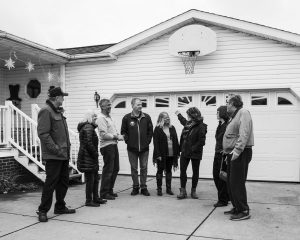
One night earlier this fall, dozens of Akron residents gathered in the basement of the local Baptist church, around folding tables sprinkled with Starburst candies. After circulating a petition condemning the proposed December rent increase, Sheedy introduced Pete Nagy, an organizer with the affordable housing nonprofit New York Communities for Change. He’d driven up that night from New York City.
“I’ve been doing this for ten years, and I’ve been losing for ten years, and I’m really sick of losing,” Nagy said. “I’m sick of our members paying 50, 60, 70% of their income on rent. I’m sick of seeing them become homeless, and I know, because I’ve lost for so long, that we can’t win on our own. And I think that means you can’t win on your own, right?”
Nagy’s message stuck with Travers, the retired nurse. She adopted her grandson ten years ago, after her daughter died in a car crash. She says he is thriving in the local public school, and she doesn’t want to move him. She, too, is sick of losing.
“I know that living in a mobile home park was hard for me because of my own prejudices,” she said. “But having lived here for a year, you know, I’m happy here. And if they raise the rent too much, I’ll have to find something else, and I can’t even imagine what that would be. No matter what happens here, I’m in. I’m willing to fight.”
This story was supported by the journalism nonprofit the Economic Hardship Reporting Project.
Correction, Dec. 4
The original version of this story misstated the name of the mobile home community. The community is known colloquially as Akron Mobile Home Park, but is officially called the Akron Manufactured Home Community. The original version of this story also misstated Gary Karaskiewicz’s age. Karaskiewicz was 68 years old at the time of publication, not 69.


